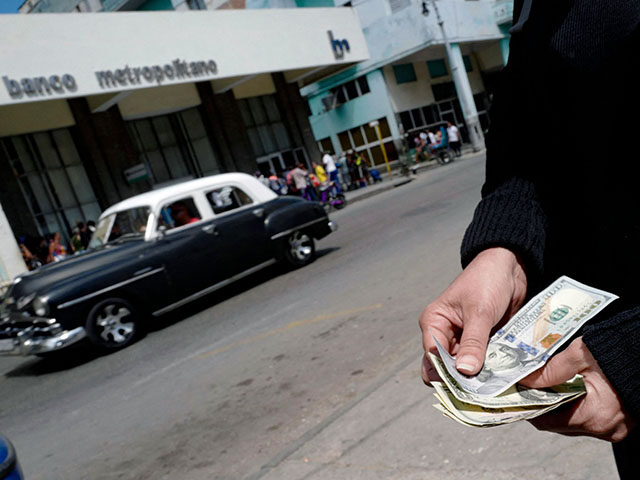The Biden administration lifted financial restrictions on Cuba on Tuesday, allowing “independent private sector entrepreneurs” in the communist-ruled nation access to the United States banking system to open U.S. bank accounts.
These “entrepreneurs” will also have access to a wide array of U.S-based internet services.
The Office of Foreign Assets Control (OFAC) announced the easing of the restrictions in a press release, asserting that the measure aims to “further implement the policy announced by the Biden-Harris Administration on May 16, 2022 to increase support for the Cuban people.”
OFAC stated that the list of measures are directed towards so-called “independent private sector entrepreneurs,” a term the office claims “better reflects Cuba’s non-state sector” and which allegedly excludes Castro regime officials and Cuban Communist Party members. OFAC does not explain in its statement that Cuba, a nation that has been ruled by a communist regime for over six decades, does not have a “private sector.”
The United States has long designated Cuba a state sponsor of terrorism due to the communist regime’s deep ties with several international terrorist organizations such as the Iranian Islamic Revolutionary Guard Corps (IRGC), the Shiite jihadist organization Hezbollah, the Sunni jihadist terrorist group Hamas, and Colombia’s National Liberation Army (ELN) and Revolutionary Armed Forces of Colombia (FARC) Marxist terrorist groups.
Although Cuba presently maintains its designation as a State Sponsor of Terrorism, the Biden administration recently had Cuba removed from the list of countries that are “not cooperating fully” with the United States in the fight against terrorism. It remains unclear at press time if the Communist Party changed any of its behavior to merit such a modification.
Last week, the Transportation Security Administration (TSA) hosted a secret tour of Miami’s international airport for five Communist Party officials, who were able to visit some of TSA’s high-security areas located inside the airport.
The visit, which both the local Miami-Dade County administration and airport personnel said they were unaware of, prompted immediate condemnation from politicians and the Cuban diaspora in Florida. The TSA issued an apology last week.
The measures announced by OFAC amend the Cuban Assets Control Regulations (CARC) — a legislation that contains the provisions of the Cuban “embargo” — to grant Cuban “independent entrepreneurs” the ability to open U.S. bank accounts and to maintain, and remotely use, the accounts regardless of where the persons involved are located.
OFAC also re-authorized “U-turn” monetary transactions, which had been prohibited in September 2019 during the administration of former President Donald Trump. “U-turn” transactions are transfers that originate and terminate outside the United States and where neither the originator nor beneficiary is subject to U.S. jurisdictions.
OFAC asserted that the measure “is intended to help the Cuban people, including independent private sector entrepreneurs, by facilitating remittances and payments for transactions in the Cuban private sector” that are authorized within the CARC’s terms.
The new easing of the restrictions also includes provisions that authorize persons subject to U.S. jurisdiction to provide access to U.S-based internet services to Cubans such as “social media platforms, collaboration platforms, video conferencing, e-gaming and e-learning platforms, automated translation, web maps, and user authentication services,” as well as cloud-based services such as remote data storage, data transport service, content distribution networks, virtual machines, software-as-a-service, and infrastructure-as-a-service.
Cuban Foreign Minister Bruno Rodríguez Parrilla criticized the measures through social media, describing them as “limited.”
“They do not reverse the cruel impact and economic asphyxiation imposed on Cuban families by the application of the Genocidal Blockade and inclusion in the list of State sponsors of terrorism,” Rodríguez Parrilla’s message read.
“These measures seek to create divisions within Cuban society, while the US government finances disinformation operations to hold the Government of Cuba responsible for the severe damages caused to the Cuban people for 65 years,” the message concluded.
Rep. Maria Elvira Salazar (R-FL) criticized the new OFAC measures, stating that President Joe Biden will give more oxygen to the Cuban dictatorship by allowing the Cuban “private sector” to open U.S. bank accounts, which she described as a “a cover for the regime to obtain foreign currency.”
“How will he ensure that the money will not go to the repressive apparatus? This Administration is complicit with Havana, once again,” Rep. Salazar said.
Cuban activist Omara Ruiz Urquiola told the independent outlet Cubanet that the purpose of the Biden administration’s new easing of financial restrictions to Cuba is the “Vietnamization” of the country so that it stops producing migrants.
“To that end, it is essential to annihilate the real civil society, asphyxiate it, annul it and replace it with the one created by Cuba’s General Intelligence Department, including the ‘independent’ media that act as legitimate spokespersons for the strategy,” Ruiz Urquiola said.
Christian K. Caruzo is a Venezuelan writer and documents life under socialism. You can follow him on Twitter here.

COMMENTS
Please let us know if you're having issues with commenting.